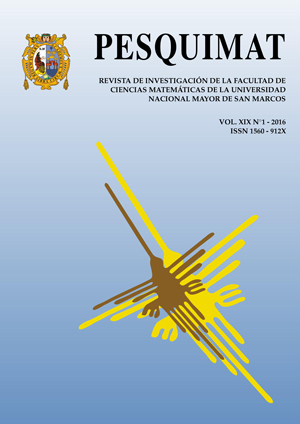Método proximal para problemas de desigualdad variacional: caso no monótono
DOI:
https://doi.org/10.15381/pes.v19i1.12515Keywords:
Problema de desigualdad variacional, distancia proximal, algoritmo proximal, operador cuasi-monótono, operador pseudo-monótono.Abstract
En el presente artículo introducimos un algoritmo de punto proximal inexacto usando distancias proximales para resolver el problema de desigualdad variacional cuando el operador involucrado en el modelo es pseudo-monótono y cuasi-monótono. Bajo algunas hipótesis naturales probamos que la sucesión generada por el método es convergente en el caso pseudo-monótono y débilmente convergente en el caso cuasi-monótono. Este enfoque extiende los resultados de Auslender, Teboulle y Ben-Tiba [1] y Brito et al.[3].Downloads
Published
Issue
Section
License
Copyright (c) 2016 Erik Papa, Lennin Ramirez

This work is licensed under a Creative Commons Attribution-NonCommercial-ShareAlike 4.0 International License.
THE AUTHORS RETAIN THEIR RIGHTS:
a) The authors retain their trademark and patent rights, and also on any process or procedure described in the article.
b) The authors retain the right to share, copy, distribute, execute and publicly communicate the article published in Pesquimat magazine (for example, place it in an institutional repository or publish it in a book), with recognition of its initial publication in the Pesquimat magazine.
c) The authors retain the right to make a later publication of their work, to use the article or any part of it (for example: a compilation of their works, notes for conferences, thesis, or for a book), provided that they indicate the source of publication (authors of the work, magazine, volume, number and date).






